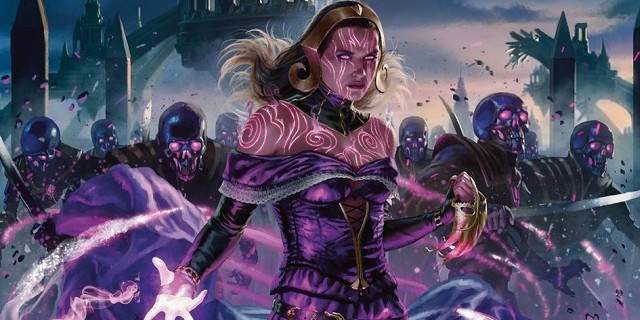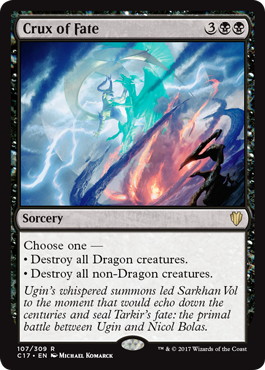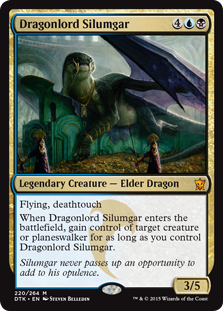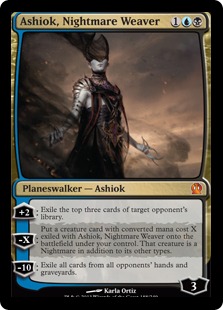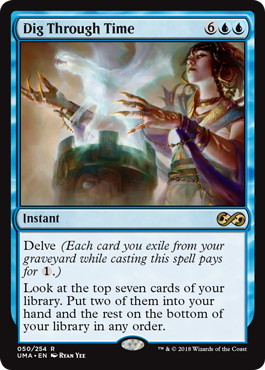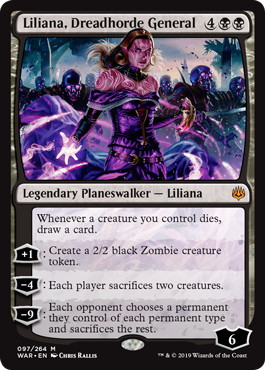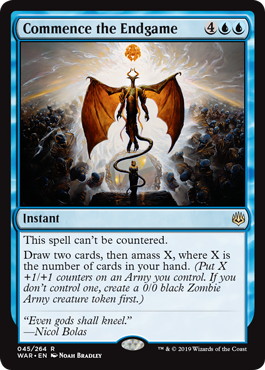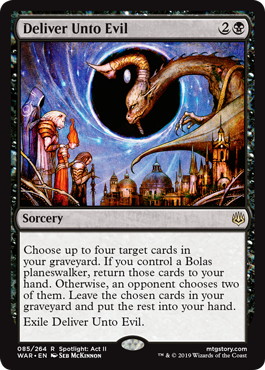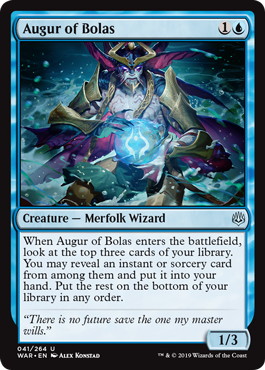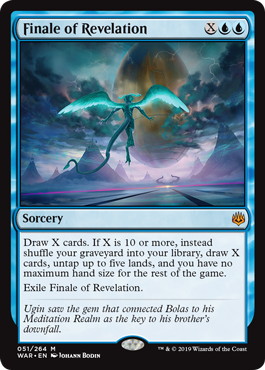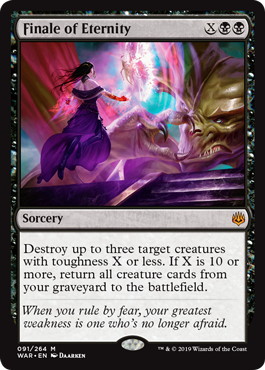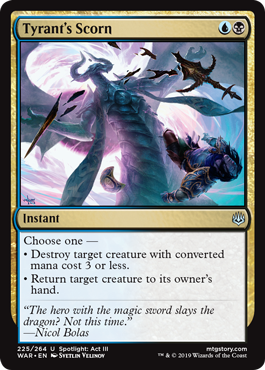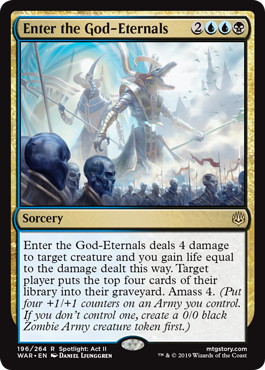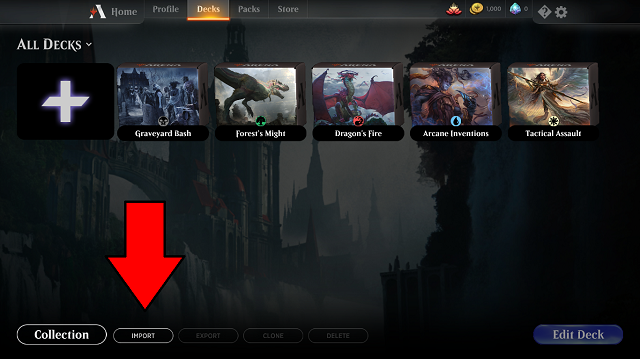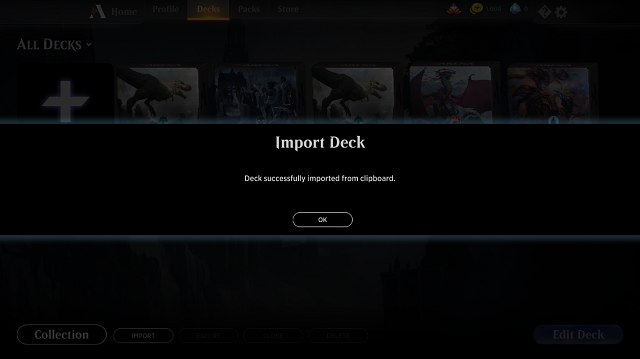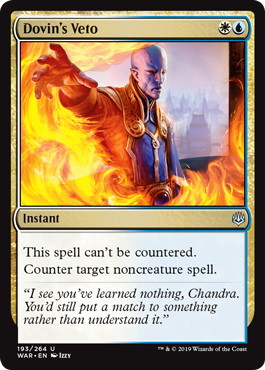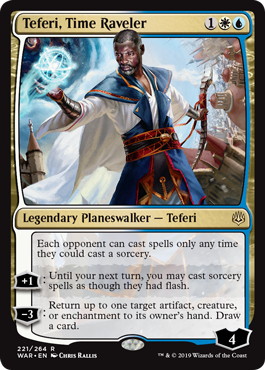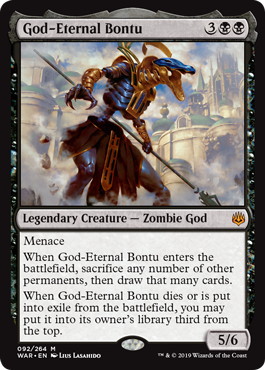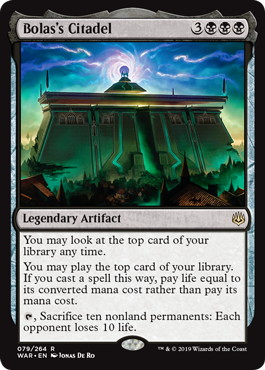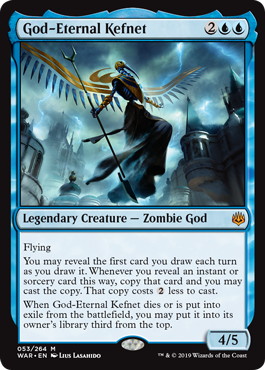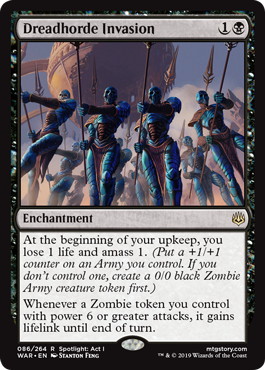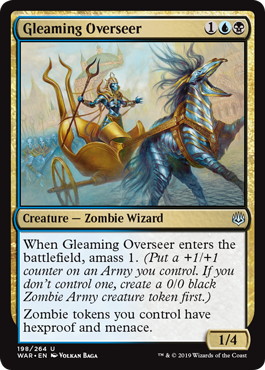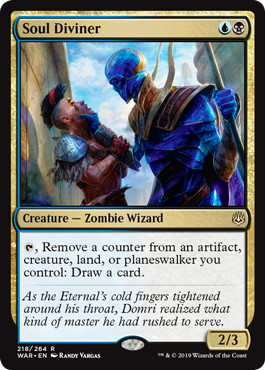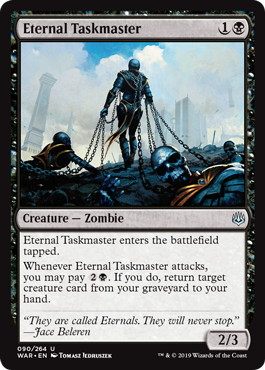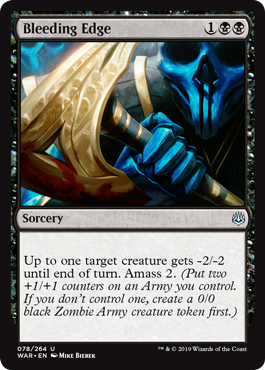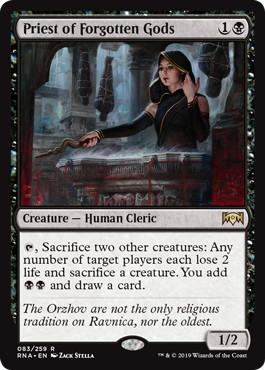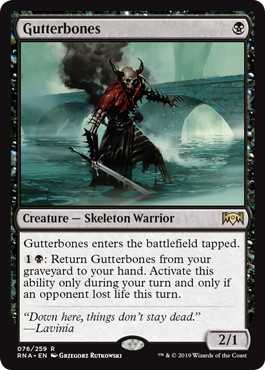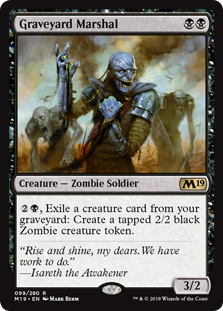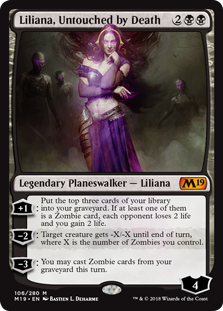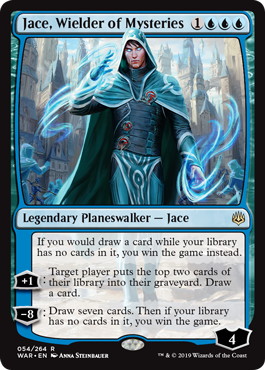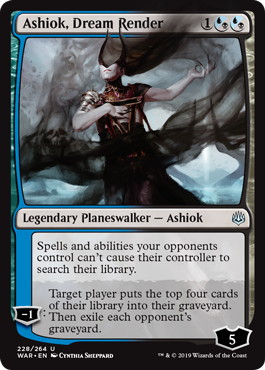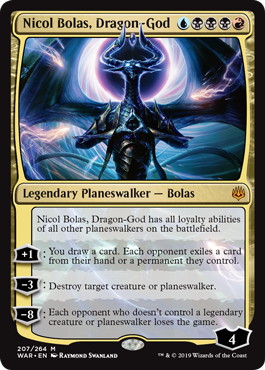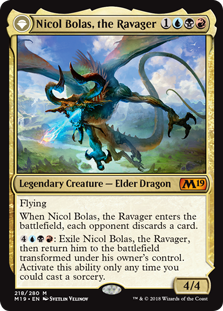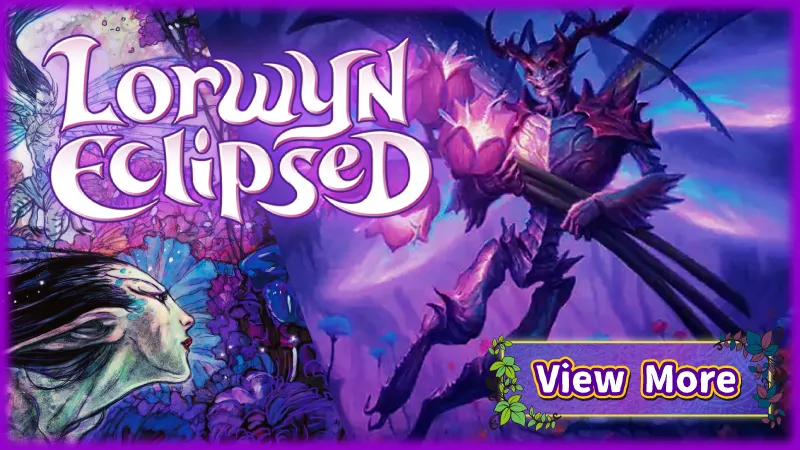Let’s Brew with Your Favorite Color!
Hello again! It’s the best time in the year – the complete spoiler for War of the Spark is out and the brewing can begin. I, myself being a Dimir enthusiast, will examine all the blue and black cards that stand out from War of the Spark today. Short storytime beforehand, why do I call myself a Dimir enthusiast?
My Story
The first Standard deck I bought was UB Dragons, Shota Yasooka’s list, which carried the mighty Control Master all the way to the finals of Pro Tour Dragons of Tarkir. My first step into the dark realms of Blue and Black.
Later that Standard season, after 《Jace, Vryn’s Prodigy》 got printed, you could see me playing lots of UB Control with 4 《Jace, Vryn’s Prodigy》 and 4 《Ashiok, Nightmare Weaver》. I traveled to a PPTQ in Germany basically every weekend. I had so much fun and I just couldn’t get enough of playing the deck. 《Dig Through Time》 was a wonderful Magic card. I will always have a smile on my face when remembering those times.
Possibilities for Dimir Based Decks
Back to the present, let’s jump into War of the Spark. Let’s start with a bang.
《Liliana, Dreadhorde General》
This card is a house. I have always wanted a Liliana with 《Barter in Blood》 as her minus ability and finally my wishes were fulfilled. 《Barter in Blood》 is quite good in a deck without creatures. Esper and Grixis have been looking for a haymaker top end card since 《The Scarab God》 and 《Torrential Gearhulk》 left us. Liliana is exactly that. Even in a deck like Sultai Midrange, where you can ramp her out, the 《Barter in Blood》 effect isn’t the worst. You can sacrifice your less relevant early game creatures to draw two cards. 《Midnight Reaper》 has proven to be a strong card and Liliana has similar ability, just much better. An overall fantastic card and I look forward to making my opponent sacrifice their freshly cast 《Carnage Tyrant》.
Of course she has her downsides. Liliana is weak against the mono-colored decks, especially Mono-Red, as well as Reclamation decks. She shines against Midrange and Control.
《Commence the Endgame》
On the topic of haymaker six-drops, let me introduce 《Commence the Endgame》 to you. An uncounterable 《Mulldrifter》 with a relevant creature type and flash. Bigger body in most cases, but without wings. This card is certainly interesting. My first thought is how does this compare to 《Torrential Gearhulk》. 《Torrential Gearhulk》 was great because of his flexibility and being able to flashback 《Vraska’s Contempt》 as your comeback move. 《Commence the Endgame》 does not interact with the board and might just enable your opponent’s removal game 1.
I think Liliana is the card I want to play over this in game 1 in my Esper or Grixis decks. But I could see 《Commence the Endgame》 as a sideboard card for Control mirrors and 《Wilderness Reclamation》 decks might play some copies in their 75.
《Deliver Unto Evil》
This card seems good at first sight, but I assure you it won’t play out well in reality. Having four cards in your graveyard is not an easy task. That your opponent is able to choose which cards you get back makes it even worse. And the bonus of returning all of them to your hand when you have a Nicol Bolas Planeswalker in play should not be considered much. When you untap with a Nicol Bolas in play you are doing fine anyways. This seems like a “Win-more” type of card. You would rather have something like 《Notion Rain》 to smooth out your early game. This card is to hard to make work.
《Augur of Bolas》
Augur is back. I have not had the pleasure to play with this card, but it looks enticing. I don’t think Control decks like Esper or Grixis want this little fellow. I believe this is more of a card used in the Jeskai or Bant color pairs. Simic Nexus, Temur Reclamation and Izzet Drakes/Phoenix come to mind. The new blue and white sweeper 《Time Wipe》 also combines nicely with the Augur, maybe there is a new Jeskai deck using 《Time Wipe》 to bounce Augur, 《Deputy of Detention》 or 《Crackling Drake》. Simic Nexus can also use their 《Blink of an Eye》s on Augur to find more copies of 《Nexus of Fate》s.
《Finale of Revelation》
This card is fancy, but that’s about it. We have better options to draw cards at a better rate. Casting this for 5 or more is excessive. If this would be an instant, which it luckily isn’t, I would be talking differently about 《Finale of Revelation》.
《Finale of Eternity》
I really want this card to be good. But all the scenarios I can imagine with this card feel worse then 《Ritual of Soot》 or 《Cry of the Carnarium》. Yes, 《Finale of Eternity》 is more flexible than those two, but the effect/cost ratio is a lot worse.
《Tyrant’s Scorn》
《Smother》 is back! Overall this card is worse than 《Cast Down》 in current Standard. Although I could see this card being played in a creature deck, the ability to bounce one of your own creatures in response to a removal against a Control deck is a nice bonus which 《Cast Down》 doesn’t have.
《Enter the God-Eternals》
More like enter the end of all Aggro decks. I will definitely enter a stage of happiness after resolving this monster of a spell against my Mono-Red opponent. I had to read this card multiple times upon seeing it the first time. Four damage, four life, 4/4 zombie and even mills you for 4 adding some additional graveyard synergies. This card does it all. Talking about comeback spells. An absolute nightmare for any Aggressive creature deck. Not much more to say, this card will see play in any deck touching blue and black colors until it rotates out of the format. Dimir is back in full force.
Sample Deck #1: Esper Control
Enough talking, here is my updated Esper Control list.
- Arne Huschenbeth
- – Esper Control
- Sample Deck #1
4 《Godless Shrine》
4 《Hallowed Fountain》
4 《Watery Grave》
4 《Drowned Catacomb》
4 《Glacial Fortress》
4 《Isolated Chapel》
1 《Dimir Guildgate》
-Land (26)- -Creature (0)-
2 《Cast Down》
1 《Dovin’s Veto》
1 《Moment of Craving》
3 《Absorb》
3 《Mortify》
2 《Cry of the Carnarium》
3 《Chemister’s Insight》
3 《Kaya’s Wrath》
3 《Vraska’s Contempt》
2 《Search for Azcanta》
1 《Teferi, Time Raveler》
4 《Teferi, Hero of Dominaria》
2 《Liliana, Dreadhorde General》
-Spell (34)-
3 《Hostage Taker》
2 《Duress》
2 《Enter the God-Eternals》
1 《Dovin’s Veto》
1 《Moment of Craving》
1 《Cry of the Carnarium》
1 《Unmoored Ego》
1 《Teferi, Time Raveler》
-Sideboard (15)-
《Dovin’s Veto》 is a clear upgrade over 《Negate》. I am going to start with two 《Liliana, Dreadhorde General》 in the main. Answering your opponent’s threat and curving out into a Liliana on six should be fairly hard to beat for any creature deck. It shouldn’t be too hard to set up a board of two creatures on your opponent’s side before playing her. Your opponent also has to respect the Zombie General and might not play a second creature onto the battlefield, which also is totally fine for a Control player. Because then we can just play and uptick her. Both scenarios are quite bad for our opponent. 《Teferi, Time Raveler》 seems to be an all-around solid card, which is at its best against Reclamation and Control decks while still being okay against creature decks.
《God-Eternal Bontu》
Five mana is a lot and this has to compete with extremely powerful other 5-drops. I suspect that this card will not find a place in Midrange or Control, but might be the top end to 《Priest of Forgotten Gods》 Aristocrat style of deck.
《Bolas’s Citadel》
I am sure, that you can do something with this in Standard. I will just let Ali Aintrazi do the work for me on this one. Unlikely that it will see play at professional level.
《God-Eternal Kefnet》
Well, this is a god I can get behind. Good rate, hard to kill and a weird card advantage ability. I am not sure where this fits exactly. Decks like Grixis and Esper have many spells, but most of them are reactive. You want to combine Kefnet with card drawing spells to go off. Reclamation decks and Izzet Drakes could use Kefnet to great effect. I am exciting to see where this guy goes. Probably the best of the five gods.
《Dreadhorde Invasion》
Let’s start by comparing 《Dreadhorde Invasion》 to 《Bitterblossom》. 《Bitterblossom》 was great, because it made multiple creatures and therefore was very strong against spot removal. 《Dreadhorde Invasion》 grows one creature bigger, which is a lot worse. Your opponent can just let you grow this to a 3/3 or 4/4 take a few hits and then reset it with a removal. The card is certainly still good against someone who doesn’t attack your life-total, but even then it’s very slow.
To make this card work, you need some more synergy, something like hexproof for zombies for example. Or a way to sacrifice the 1/1 army every turn.
《Gleaming Overseer》
…Talking about hexproof. With 《Gleaming Overseer》 you can build your 《Dreadhorde Invasion》 safely and protected. Menace is also not to underestimate, makes chump blocking in the lategame difficult. The thought about curving 《Dreadhorde Invasion》 into 《Gleaming Overseer》 into a Turn 5 《Enter the God-Eternals》 is very intriguing.
《Soul Diviner》
2/3 is a good statline against the Aggressive mono-colored decks of the format. In combination with 《Dreadhorde Invasion》 you have built yourself a 《Phyrexian Arena》. So far, so good. We might be able to make something work here.
《Eternal Taskmaster》
This card seems too weak for Constructed. Entering tapped is not great against Aggro and the ability is to slow. Basically a worse 《Graveyard Marshal》.
《Bleeding Edge》
Hard to evaluate removal spell. -2/-2 is too weak for a normal deck that doesn’t care much about the body. Although it might be good enough in a Zombie tribal deck.
Sample Deck #2: Dimir Zombies
- Arne Huschenbeth
- – Dimir Zombies
- Sample Deck #2
5 《Island》
4 《Watery Grave》
4 《Drowned Catacomb》
1 《Dimir Guildgate》
1 《Blast Zone》
-Land (25)- 4 《Diregraf Ghoul》
4 《Gutterbones》
4 《Graveyard Marshal》
4 《Priest of Forgotten Gods》
3 《Death Baron》
3 《Gleaming Overseer》
2 《Midnight Reaper》
-Creature (24)-
3 《Enter the God-Eternals》
4 《Dreadhorde Invasion》
2 《Liliana, Untouched by Death》
-Spell (11)-
A first build that utilizes some of the above named synergies. I am playing 《Priest of Forgotten Gods》 plus 《Gutterbones》 instead of 《Soul Diviner》 and maybe more Planeswalker/Removal. Priest is great with Invasion, creating mana for 《Graveyard Marshal》 to re-use the sacrificed creatures and making 《Liliana, Untouched by Death》 minus ability more explosive. 《Soul Diviner》 over Priest is more reasonable if you expect a high amount of 《Cry of the Carnarium》.
The numbers in this list are most certainly incorrect, but I like where this is going. Against the Aggressive decks you build a giant lifelinking Army or grind them out with early blockers plus your card advantage engines. Against Midrange and Control you most likely need some help from the sideboard, but even those matchups certainly look doable. An early sideboard could look like this.
- Dimir Zombies
- – Sample Sideboard
2 《Cast Down》
2 《Bleeding Edge》
2 《Unmoored Ego》
2 《Liliana, Dreadhorde General》
1 《Arguel’s Blood Fast》
1 《Sorcerous Spyglass》
1 《Liliana, Untouched by Death》
-Sideboard (15)-
《Jace, Wielder of Mysteries》
This iteration of Jace is certainly solid. A card drawing engine with five loyalty, but the triple blue casting cost is unfortunate. 《Karn, Scion of Urza》 and 《Chemister’s Insight》 are comparable to Jace and will get the nod over this hard to cast Planeswalker.
《Ashiok, Dream Render》
Unfortunately this Ashiok doesn’t come close to their previous self. There is almost no real graveyard deck and search effects are rare to find in the current Standard. I doubt that they’ll see any play at all, sideboards included.
《Nicol Bolas, Dragon-God》
I can’t really make an article about Dimir cards in War of the Spark without mentioning the man, the myth, the legend himself: 《Nicol Bolas, Dragon-God》. This card is definitely worthy of the name – Nicol Bolas. Basically an 《Ob Nixilis Reignited》 on steroids. How impactful the static ability will be is hard to evaluate, but it is certainly a nice bonus. The +1 is one of the best Planeswalker plus abilities, maybe the actual best ever +1 ability.
Sample Deck #3: Grixis Dragon-God
Here is a taste of how the best deck of War of the Spark Standard might look like.
- Arne Huschenbeth
- – Grixis Dragon-God
- Sample Deck #3
1 《Island》
4 《Blood Crypt》
4 《Watery Grave》
3 《Steam Vents》
4 《Dragonskull Summit》
4 《Drowned Catacomb》
3 《Sulfur Falls》
-Land (26)- 3 《Nicol Bolas, the Ravager》
2 《Hostage Taker》
-Creature (5)-
3 《Moment of Craving》
1 《Cast Down》
3 《Bedevil》
2 《Cry of the Carnarium》
2 《Ritual of Soot》
1 《Chemister’s Insight》
2 《Enter the God-Eternals》
4 《Discovery/Dispersal》
3 《Disinformation Campaign》
3 《Nicol Bolas, Dragon-God》
1 《Liliana, Dreadhorde General》
-Spell (29)-
2 《Disdainful Stroke》
2 《Unmoored Ego》
2 《Enter the God-Eternals》
1 《Hostage Taker》
1 《Cast Down》
1 《Negate》
1 《Cry of the Carnarium》
1 《Commence the Endgame》
1 《Liliana, Dreadhorde General》
-Sideboard (15)-
Conclusion
And with that I will let you go, I hope you enjoyed my insights on Dimir as much as I enjoyed writing them.
Until next time,
Arne Huschenbeth @Huschenmtg on Twitter


